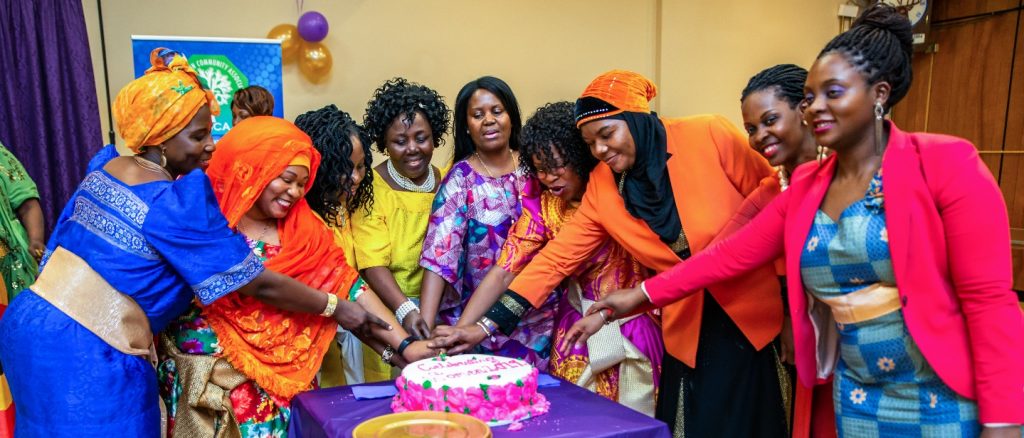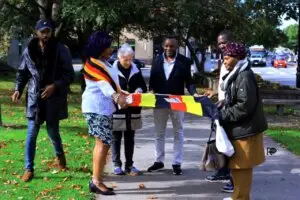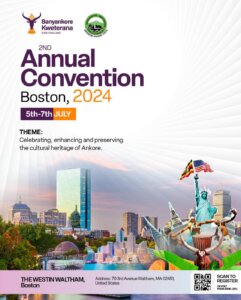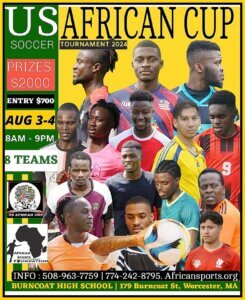I have lived in Boston for over 18 years. Back then, the sense of community was not as strong as it is today mainly because we were not as many then as we are now. Over the years, the Ugandan population in Boston has tripled and life has evolved.
It is not as easy as it seems to adjust to life in the diaspora. The transitional process from the culture we grew up around, getting over the cultural shock and adjusting to a different country and lifestyle, takes time. What has made life much better for the past years is that we have incorporated our own culture within our Boston community in different ways.
SOCIAL
In the late 90ʼs, there wasn’t a social club that we would identify as Ugandan. People used to go elsewhere for entertainment and to experience the night life. They went to places like the “EKIKANISA”. This was followed by Kampala Club run by Hawa Ssebunya.
The sense of community wasnʼt felt in social events such as weddings. Mobilizing funds for such events was on a very private level. This has evolved and taken on a life of its own. Our community now comes together in support of unions both physically and financially.
Currently, there are popular spots like Club Rendezvous at 596 Moody St ,and Rhino lounge at 11 cooper st, Waltham. This is where Ugandans go to mingle with friends and dance to the flavorful Ugandan music from our local DJ’s. Both establishments are managed by Ugandans. Just as the music has evolved, many more DJ’s have stormed the scene compared to the time when the popular Dj Robert Mukiibi dominated music and entertainment
Recently a group of Ugandans opened up a recreational center called Africano Waltham. The center caters for the cultural needs of our younger population, children ranging from 4 to 16 years. They get assistance with homework, theyʼre also taught language, Ugandan culture, dance, drama, and other extra curricular activities.
RELIGION
When it comes to practicing religion, members of the different faiths used to congregate in their homes for prayers until Pastors and Sheikhs were able to rent places for prayers. Pastor Katende, Pastor
Mutyaba and Late Pastor
Kawala graced the religious
scene back in the day. For
the Moslems, it was Sheikh
Mayanja or Sheikh Ddumba.
Now there is a lot more
younger Pastors and
Sheikhs to cater for our
growing community and
spiritual needs.
Currently, the Ugandan community in Boston has more than 12 Churches; Anglican, Pentecostal and catholic, 2 Seventh-day Adventist Churches and 2 Mosques. In some of these places, prayer and worship is conducted in Luganda.
It is humbling to know that the religious culture has fully been incorporated in our day today lives. Other than the routine Friday, Saturday and Sunday prayers, Ugandans celebrate days like MARTYS DAY and EID in a very festive way.
RESTAURANTS
The late Hajjat Safina initiated the culture of preparing our local food which she sold right out of her Pearl of Africa store on Moody Street in Waltham. Soon enough, other Ugandans caught on and invested in eateries and catering services.
As of now, we have 4 established eateries that donʼt only cater for Ugandans but also other foreigners from different parts of the world; Karibu restaurant Rendezvous Kitchen, Rhino Lounge and Namwanje at India Market. In addition to this, we have 5 known caterers who handle services for private events such as weddings, Graduation parties, birthdays, etc.
RETAIL SHOPS AND SALOONS
There has been a lot of growth in the retail/ entrepreneurship department. In the 90s the late Hajjat Safina opened the doors for the rest of the Ugandans with a strong business acumen that would later follow in her footsteps. Her speciality was arts and craft. She later expanded her business to include food catering on the side.
Currently, we have about 3 retail shops specializing in cosmetics, clothing and accessories.
When it comes to saloon services, Martin Sekyanzi and Kato parma were to go- to specialists for saloon and barber services. With time, other young men acquired the skills and necessary certifications to invest in the hair business. We now have the Friends saloon, Kampala Saloon and Sister Saloon in Waltham. There are also on-call barbers and beauticians who will do the job in the comfort of your home and others who provide services within their homes.
JOB OPPORTUNITIES Boston is blessed enormously with job opportunities. A handful of Ugandans have opened up hiring agencies to connect employers to employees. Also fellow Ugandans are good at referring others when employment opportunities present themselves.
Many other offices have opened up ranging from tax filing services, consultancies, interpreters, massage parlors, boutiques etc.
EDUCATION
In 90ʼs the only formal education we had was the “KASOMO” and this was the CNA or HHA certifications. It was not as easy for most of us to access a college or University education mainly because we lacked guidance and information.
Thanks to reputable members in our community like Prof.Lugira, Moses Kalemba, James Sserumaga, Owek.Kato Kajubi, Mr. Kiguli and Muky. Rosette Sserwanga. They identified the need and took it upon themselves to reach out to the youths of that time. They played a significant role in changing our mindset about our future in the diaspora by offering services and guidance on how to access educational and other resources available to immigrants. They taught us that It was absolutely necessary to break out of our comfort zone and try to emerse ourselves into the local culture.
Nowadays, the youth are more inclined to go back to school and enrich themselves academically. As a result, we have many Ugandans in different professions like lawyers, Nurse Practitioners, Registered Nurses, Radiologists, Teachers, Bankers, the list is endless! This has been our biggest achievement by far.
COMMUNICATION
In the 90s, we mostly relied on a phone call from a friend, word of mouth and from information given after our weekly sermon in our respective prayer houses.
Presently, there are 2 on line Radios; Radio Uganda Boston and Radio Uganda Usa. We also have Diaspora Tv on which diverse empowering programs are hosted and are well received basing on the listenersʼ and viewersʼ responses.
Social media has also played a big role in improving how Bostonians share information.
Thereʼs been significant growth and development on an individual as well as community level. We have become one big extended family that look out for each other. This is manifested in how we take care of those in need. When a member is going through a difficult time, is hospitalized, experiences a loss in the family or is in trouble with the law, our community will rally around him/her and offer physical, emotional and financial support.
All in all, It is important to know that we face challenges as well. Living in a foreign country far away from home is a challenge in itself. The level of stress, living life in the fast lane while trying to balance with community involvement, is a lot higher so we are bound to have a difference in opinion as far as how to get our community to the next level but our biggest motivation is the legacy we want to leave behind for our children especially those born here and the ones that will immigrate to Boston to continue with our community values.




